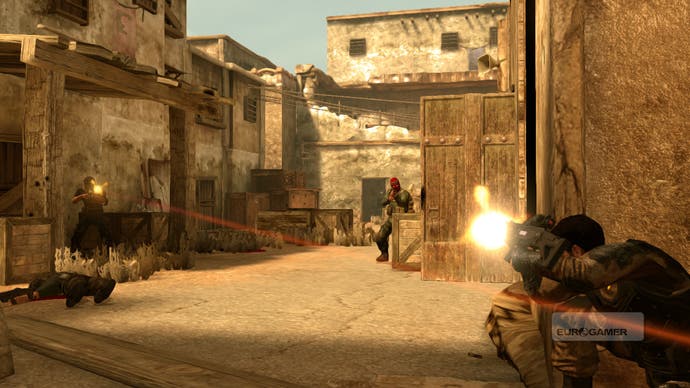Alpha Protocol
007/10?
As the cast list expands and the action abilities opened up by the levelling process become increasingly cartoony - two favourite unlocks are an evasion skill which allows you to go unnoticed for a few seconds even if you absolutely blow your cover, and a temporary shotgun boost that lets you knock down enemies as you hit them - Alpha Protocol starts to come to terms with itself as a slightly tongue-in-cheek enterprise. Helpfully, the script has plenty of classy moments, both in terms of the cut-scenes and the text, if you're willing to plough through the emails you'll constantly receive from both friends and enemies. Even the action, formed from pieces which are only really second-rate by themselves, eventually comes together into something that tugs you forward with surprising insistence.
And while it's a linear adventure at heart, the game takes its commitment to player choice fairly seriously. It offers plenty of moments where you have control over the big things - who lives, who dies, who becomes an ally and who becomes a boss battle - as well as the little things, like how your approach to a mission changes what your handler thinks of you.
The game's reputation system is fun, if limited - a lot of the time, you're really only accessing another layer of buffs if a handler likes you, and de-buffs if they turn against you - but it ties into the game's Mass Effect-cribbed dialogue system pretty smartly. With options allowing you to respond to questions in either a suave, aggressive, or professional manner - Bond, Bauer, or Bourne by turn - the whole thing is given a snappiness that BioWare's game lacks as you automatically answer questions after a certain time limit even if you haven't made a choice. Sure, it's not rare to come back from making a sandwich to discover that the game has ploughed through an entire conversation tree without you, and all your friends now think you're a bit of a dick, but it also means that dialogue has a genuine sense of flow.

Either way, it's a regular pleasure, if not a deeply engrossing one, to work out how to speak to a particular character to get the best out of them, and the responses are often handled with wit. With a story that's as deep or shallow as you want it to be, the writing in Alpha Protocol, while far from perfect, is definitely more of a strong point than the game's technical aspects, and it's worth lingering over some of the finer detailing.
Like Worcester Sauce, Alpha Protocol's separate ingredients might be slightly unappetising, but they come together in a quietly effective manner. Unlike Worcester Sauce, it will certainly frustrate you more than it should, and in between the deathlike character models and bizarre misapplications of things like depth of field effects, it will struggle to convince you the team had enough time to finish it up.
But, if you're willing to put in the effort, it can steadily win you over. Obsidian can't really compete with the bigger boys in the RPG field, then, but it's carved out a little space to call its own. With ambition instead of budget, and integrity instead of polish, in the end the choice of whether to persevere or not is pretty easy to make.
